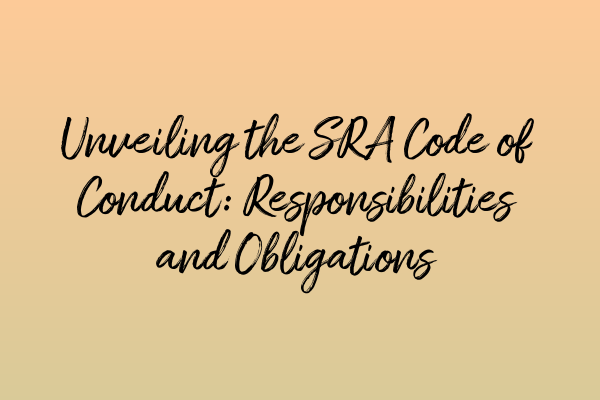As a solicitor, it is essential to understand and adhere to the Solicitors Regulation Authority (SRA) Code of Conduct. This code sets out the responsibilities and obligations that solicitors must uphold in their professional practice. In this blog post, we will unveil the SRA Code of Conduct and explore the key aspects that solicitors need to be aware of to maintain professional integrity.
Chapter 1: You and your client
The first chapter of the SRA Code of Conduct focuses on the solicitor-client relationship. It emphasizes the importance of acting in the best interests of the client, maintaining their confidentiality, and providing them with accurate and clear advice.
One key obligation in this chapter is the duty to avoid conflicts of interest. Solicitors must ensure that they do not act for clients with conflicting interests, as this could compromise their ability to provide independent and unbiased advice. Understanding the concept of conflicts of interest is crucial for solicitors to navigate potential ethical dilemmas.
If you would like to learn more about ethical challenges in criminal defence, click here to read our related article.
Chapter 2: Behaving in a way that maintains the trust the public places in you and the provision of legal services
The second chapter highlights the importance of maintaining public trust in the legal profession. Solicitors must conduct themselves in a manner that upholds the reputation and integrity of the legal profession. This includes behaving honestly, with integrity, and in a way that promotes the rule of law.
As a solicitor, it is essential to communicate with clients, colleagues, and the public in a way that is respectful and professional. This chapter also emphasizes the importance of treating all individuals fairly and without discrimination.
For tips and tricks on excelling in criminal law for your SQE preparation, check out our article on SQE Prep: Tips and Tricks to Excel in Criminal Law.
Chapter 3: Conflicts
In chapter 3, the SRA Code of Conduct delves deeper into conflicts of interest. It provides detailed guidance on identifying and managing conflicts of interest to ensure that solicitors act in their clients’ best interests.
To avoid conflicts of interest, solicitors must have effective systems and processes in place. This includes conducting thorough conflict checks before taking on new clients or cases. By properly managing conflicts, solicitors can protect their clients’ interests and maintain professional integrity.
Chapter 4: Confidentiality and disclosure
The fourth chapter of the SRA Code of Conduct addresses the duty of confidentiality. Solicitors have a duty to preserve client confidentiality and to only disclose information when authorized or required by law.
Understanding the boundaries of confidentiality is essential for solicitors to maintain trust with their clients and protect sensitive information. Solicitors must also comply with legal requirements regarding disclosure, such as reporting suspicions of money laundering.
Chapter 5: Your client and the court
Chapter 5 focuses on the relationship between solicitors, their clients, and the court. Solicitors have a duty to act with honesty and integrity in their dealings with the court, ensuring that they present accurate and reliable information.
Effective advocacy skills are crucial for solicitors when representing their clients in court. To master the art of questioning during cross-examinations, make sure to read our article on Cross-Examination Techniques: Mastering the Art of Questioning.
Chapter 6: Equality and Diversity
Chapter 6 emphasizes the importance of promoting equality and diversity in the legal profession. Solicitors must not discriminate against their clients or colleagues based on protected characteristics such as race, gender, or disability.
By fostering an inclusive working environment and treating everyone fairly, solicitors can contribute to a more diverse and representative legal profession.
Chapter 7: Public Interest
The final chapter of the SRA Code of Conduct focuses on the solicitor’s duty to act in the public interest. Solicitors must consider the wider implications of their actions and decisions, ensuring that they contribute positively to society as a whole.
One aspect of acting in the public interest is exploring non-governmental prosecutions in criminal cases. To learn more, read our article on Private Prosecutions: Exploring Non-Governmental Prosecutions in Criminal Cases.
By upholding the SRA Code of Conduct, solicitors demonstrate their commitment to professionalism, ethical practice, and the highest standards of client care. Understanding and adhering to the responsibilities and obligations outlined in the code is essential for solicitors to maintain trust with their clients, colleagues, and the public.
For a deeper understanding of the legal parameters surrounding assault and battery, check out our article on Assault and Battery Laws: Understanding the Legal Parameters.


Leave a Reply